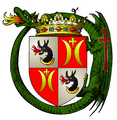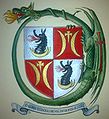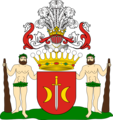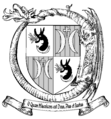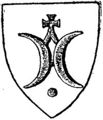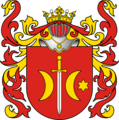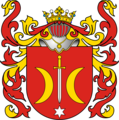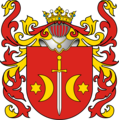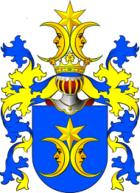Heraldyka
Heraldyka - Heraldry
Article on Wikipedia (Artykuł na Wikipedii)
True Ostoja Coat of arms - prawdziwe herby Ostoja
Those Coa are painted according to heraldic rules, those are true to the heritage of ancient Ostoja families. The last two photo's are of Nicolaus Ostoja de Sciborzyce (Lesser Poland) from ab. 1232 that can be seen on the walls of the Church that he partly rased (finished) and the last is from the seal of Dobieslaw de Koszyce in year 1381. It is significant that both seal and the sign on the Church wall are identical. Therefore, we can presume that it is original sign of the family, at least from the time when family joined christian society.
Herby Ostoja:
Imaginary Ostoja Coa
Those Coat of arms as below are of noble families and linked en masse to Ostoja simply because the moon or the sword in the shield. The list of imaginary Ostoja Coat of arms might be longer than here presented. There are also Russian families that was ennobled and given the Coat of arms that also looked like Ostoja during the partition time and that some call Ostoja. It is also possible that Coa where painted with error during nobility verification process in the time of partition.
Ominany Ostoi które nie są herbem Ostoja
Families that are members of the Clan of Ostoja - rodziny które należą do rodu Ostoja:
From the left: Błyszczanowicz - ancient family noted in year 1497, error in 1806 by Russian authorities in Kiev that painted the CoA in wrong way. Miklaszewski - this family was adopted to the Clan of Ostoja in 1569 when family received nobility. Suppose to sign original Ostoja CoA. Third from the left is Ochocki CoA that received nobility in year 1683 and was adopted to the Clan of Ostoja and sign modern version of Ostoja with sword instead of a cross. Fourth from the left, Gawłowski family of ancient origin and with CoA that is simple error of foreign authorities, suppose to be original version of Ostoja. Strzałkowski (Strzałka) family is of ancient origin, also here the CoA is modified during partition of the Commonwealth but here most probably family helped authorities to change their original CoA. Purpose or reason of that is not known. Finally CoA of Nagorski family that received nobility in year 1590 and was adopted to the Clan of Ostoja, Note that there is another family of Nagorski of ancient origin but it is almost impossible now to separate those families from each other.
Families that are NOT members of the Clan of Ostoja - rodziny które NIE należą do rodu Ostoja:
First row from the left: Bogorajski, received nobility year 1775 and a rang crown of a Baron not being a Baron, although in this version crown of the noble by error since there are no other paintings of correct CoA jet. Next CoA is of Raczewski (Racięski) family that also received nobility in year 1775. The CoA of Kleczewski family followed by Mokrzewski family that are not members of the Clan but show similar CoA to Ostoja. Last three CoA in this row are of families Orda, Plat and Wasilewski - none of them are members of the Clan, CoA have been simply added to Ostoja and are called modified Ostoja CoA.
Second row from the left: CoA of Fincke von Finkenthal family that received nobility in 1805, CoA of Ostaszewski family that received nobility in 1785, here we believe that the name is wrong spelled, should be Ostarzewski. Third CoA from the left is of Krall family that received nobility in year 1768 followed by the CoA of Szyszko family that should be not mixed up with ancient Szyszkowski de Szyszki family. The CoA of Turkuł family that received nobility in year 1676, this family is extinct The last two CoA in the row are of Wysocki and Zawadzki families. Both families have never been considered as members of the Clan of Ostoja but also here their CoA become recognized as Ostoja with modification. In the case of Wysocki family belong to the Clan of Kolumna with modified CoA called Kolumna ze skrszydlami - Kolumna with wings.
Von Finkenstein Coat of Arms
Finally, below is the Coat of arms of ancient German family of von Finkenstein, also written as Fink von Finkenstein referring to family of Fink that is noted in German records already in XIII century. This family moved at that time to the land occupied by Teutonic Knights. In time this family become one of most prominent German families owning great estates, palaces and holding highest positions, they belong to the top of German aristocracy.
It is not known who invented to call this Coa Ostoja Pruska but it is significant example of breaking every possible heraldic rule in the name of Polish Clan tradition where Clan members used same coat of arms. It seems that this Coa was added to Ostoja almost by force. There are two families that joined Clan of Ostoja in XIV-XVI century, lived in Pomerania and that have been given this Coat of arms by all publications - the families of Lniski and Skrzyszewski. Here is is notable that Lniski family in Pomerania is named by German books (records of Teutonic Knights) already in the end of XIV century and that we also have records of the Skrzyszewski line that in XVIII century suddenly changed their name to Lniski. Skrzyszewski have records back to XVI century.
It is presumed that the Lniski family with roots dating back to XIV century used original Ostoja Coa and just because this family lived in Pomerania or Prussia, they have been given the Coa of the Finck family and called it "Ostoja Pruska".

